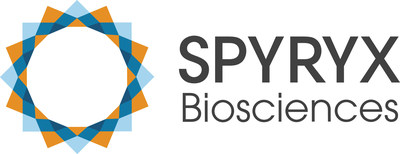DURHAM, N.C., May 9, 2017 /PRNewswire/ -- Spyryx Biosciences, Inc., a clinical-stage biopharmaceutical company developing innovative therapeutics to address severe lung disease, announced today that the American Journal of Respiratory and Critical Care Medicine, also known as "The Blue Journal", has published a scientific paper about the Company's lead therapeutic, SPX-101, and its potential to restore mucus transport in cystic fibrosis (CF) patients.

The American Journal of Respiratory and Critical Care Medicine is published by the American Thoracic Society and focuses on human biology and disease, as well as animal studies that contribute to the understanding of pathophysiology and treatment of diseases that affect the respiratory system and critically ill patients.
The paper, SPX-101 Is A Novel ENaC-Targeted Therapeutic for Cystic Fibrosis That Restores Mucus Transport1, investigates the in vitro and in vivo efficacy of SPX-101, a peptide mimetic of SPLUNC1's natural regulation of ENaC activity.
SPX-101 is an inhaled peptide with a novel, biological mechanism that regulates epithelial sodium channel (ENaC) density in the airway. The drug is designed to restore a cellular pathway in the lung that promotes airway hydration and mucociliary clearance, which are dysfunctional in CF. The mechanism of action of SPX-101 is independent of the genetic mutations that cause CF, which makes it a potential therapy for all CF patients.
The authors used biochemical approaches to demonstrate that SPX-101 binds specifically to ENaC, but not structurally similar proteins, inducing ENaC internalization in human bronchial epithelial cells from healthy and CF donors. Removal of ENaC from the plasma membrane caused a significant reduction in amiloride sensitive current and increased hydration of the airway epithelial cell cultures. When tested in vivo, they demonstrated that SPX-101 significantly increased survival of ENaC transgenic mice and increased mucus transport in mouse and sheep models of CF lung disease. The authors concluded that via this unique biological mechanism of action in removing ENaC from the cell surface, SPX-101 promotes a durable inhibition of sodium absorption resulting in increased mucus transport.
"We are honored to have the opportunity to share our work on SPX-101 with the research and clinical community through this publication in The Blue Journal," said Timm Crowder, PhD, Senior Vice President, Technical Operations for Spyryx and one of the authors of the paper. "It highlights the opportunity for a treatment approach that extends beyond mutation specific therapies, targeting treatment for all CF patients. The strong preclinical data supporting SPX-101's ability to promote airway hydration and mucociliary clearance suggest high potential for our product to deliver clinically meaningful benefit, which we will thoroughly investigate in our Phase 2 study beginning mid-2017."
About Cystic Fibrosis
CF is an autosomal recessive genetic disorder affecting approximately 75,000 individuals worldwide. The disease is caused by mutations in the gene for the cystic fibrosis transmembrane conductance regulator (CFTR) protein. CF profoundly affects the lungs and respiratory tract and is characterized by dehydration of the airway surface, resulting in reduced mucus clearance, the lung's principle mechanism for maintaining a clean environment. The mucus becomes thick and sticky, progressively accumulating into obstructions that block airflow and result in recurrent colonization of the airways by viruses and bacteria. These pathogens lead to frequent, acute lung infections, chronic inflammation, exacerbations, and impaired lung function. The long-term result of the disease, is progressive, permanent tissue damage and scarring (fibrosis) in the lung. No cure for cystic fibrosis is known, although several treatments have been approved to address the underlying cause of the disease in some patients. Despite currently available treatment, the median age of survival for CF patients is approximately 40 years of age.
About Spyryx Biosciences
Spyryx Biosciences is a privately held, clinical-stage biopharmaceutical company developing innovative therapeutics to address severe lung diseases. Spyryx's lead clinical candidate, SPX-101, is a novel treatment for cystic fibrosis that has successfully completed a Phase 1 study in healthy volunteers and is advancing into Phase 2 in CF patients. The product has demonstrated a robust ability to restore mucociliary clearance in animal models of the disease and has the potential to improve lung function in all cystic fibrosis patients independent of their CFTR mutation. The Spyryx leadership team and scientific staff have extensive experience in the development of respiratory medicines and work closely with a broad group of clinical and scientific experts in the pulmonary field. Spyryx is funded by a first tier syndicate of life science investors, including Canaan Partners, 5AM Ventures and Hatteras Venture Partners. Further information regarding Spyryx Biosciences is available at www.spyryxbio.com.
1SPX-101 is a novel ENaC-targeted therapeutic for cystic fibrosis that restores mucus transport
David W. Scott1*, Matthew P. Walker1, Juliana Sesma1, Bryant Wu1, Timothy J. Stuhlmiller1, Juan R. Sabater2, William M. Abraham2, Timothy M. Crowder1, Dale J. Christensen1#, Robert Tarran1, 3
1Spyryx Biosciences, 801-10 Capitola Dr, Durham, NC, 27713. 2Department of Research Mount Sinai Medical Center, Miami Beach, FL, 33140. 3Marsico Lung institute and Department of Cell Biology and Physiology, 111 Mason Farm Rd, The University of North Carolina, Chapel Hill, NC, 27599-7248. #Current Address: Duke University Medical Center, Department of Medicine, Durham, NC 27710
To view the original version on PR Newswire, visit:http://www.prnewswire.com/news-releases/the-american-journal-of-respiratory-and-critical-care-medicine-publishes-study-of-spyryx-biosciences-spx-101-a-novel-enac-targeted-therapeutic-for-cystic-fibrosis-that-restores-mucus-transport-300454404.html
SOURCE Spyryx Biosciences, Inc.





